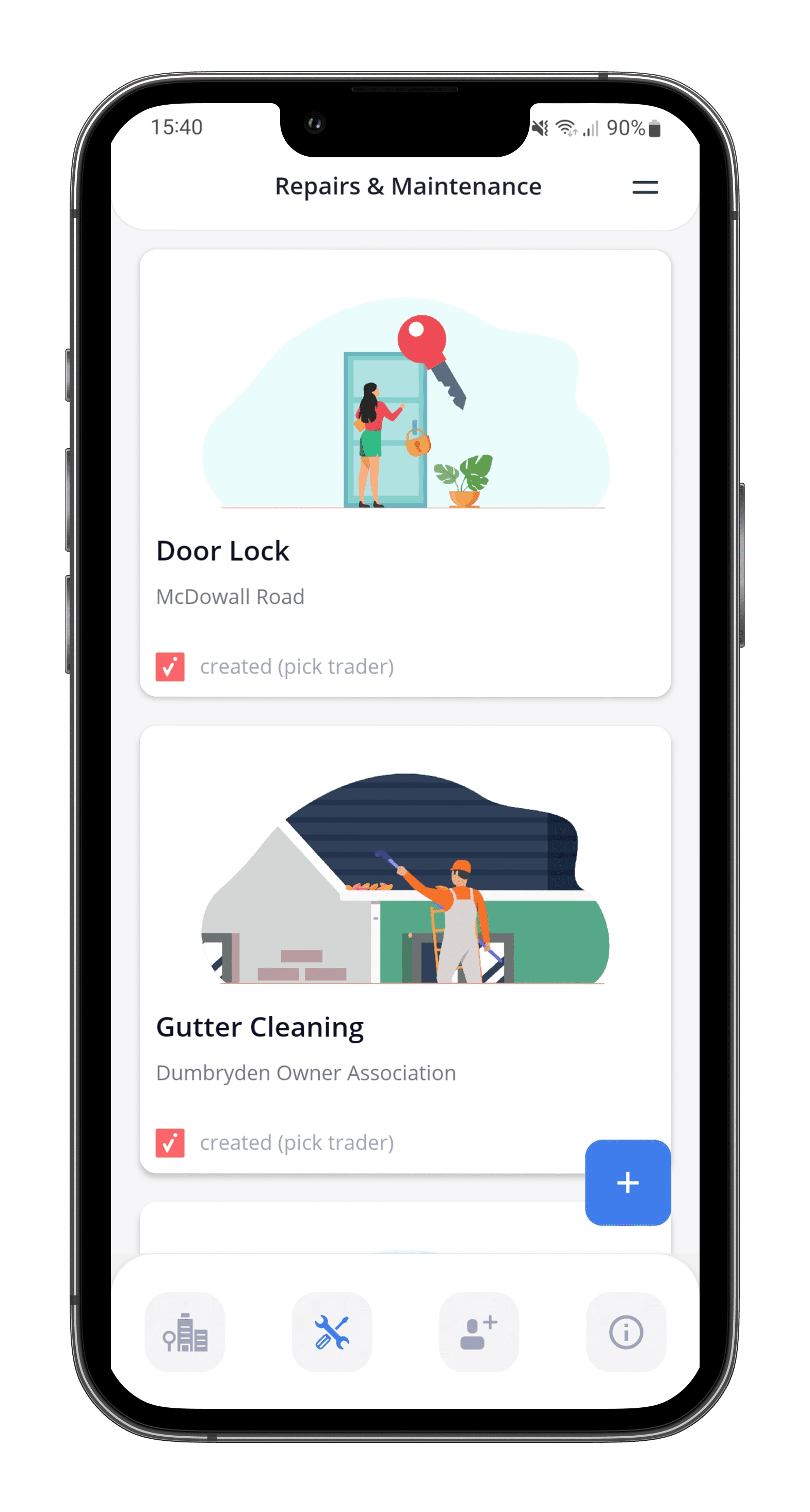In Scotland, property owners have a duty to maintain the common areas of their property (chief amongst which, the roof) and that’s not an easy task.
Many shared blocks – “tenements” in legalese, whether or not they are the old-style tenements you’re thinking about – have fallen into disrepair due to owners not paying sufficient attention to them.
According to BEFS (Built Environment Forum Scotland), up to a half of tenements in Scotland need critical repairs today and nearly a third are in need of urgent attention.
In Glasgow, the vast majority of properties have factors (professionals who deal with the maintenance and repairs of common areas) who are responsible for making sure that the building is safe and as comfortable to live in as possible.
However, in many areas of the country, including Edinburgh, factors are less prevalent. The charity Under One Roof estimates that a half to two-third of blocks in Scotland are self-factored, which means that block’s proprietors come together to carry out repairs and maintenance, or at least, that’s the theory.
The problem with self-factored blocks is that unless someone in the building takes a very proactive approach to looking after it, and other owners follow with a lot of goodwill, often nothing gets done… and when that’s the case, consequences can be catastrophic.
In 2019, the City of Edinburgh Council attended to fallen masonry around the city 17 times on a very windy day. These were 17 blocks that nearly fell on people’s heads, with potentially fatal outcomes.
Tenements in poor condition also drastically reduce the selling price of flats, and owners that sell could still be liable for the cost of some of the outstanding repairs they leave behind.
So, if you live in a tenement and your block doesn’t have a factor, you are responsible for driving repairs and maintenance yourself. To help you do so productively, here are the five most important things you need to know about self-factoring (providing we’re not talking about an emergency).
Check all title deeds before you do anything
Getting repairs over the line is about following a process and where common repairs are concerned, you must check liabilities in all property’s title deeds (at a minimum, all the ones you can find online on “ScotLis”).
Why? Because specific provisions in your title deeds take precedence over the Tenement Management Scheme.
And why is that important? Because it can cost you time and money.
Imagine this: you do a big roof repair costing £50,000. You divide everything equally. You get three quotes from contractors, get a vote done, start gathering payments. One person doesn’t pay, but you’re OK, as you access the council’s “missing share scheme,” so that the work can still go ahead. The council receives your application and… rejects it. That’s because they checked your title deeds, and those specified that you had to calculate liabilities based on “rateable value,” and not assume an equal share. Now, unless you want to pay the missing share yourself, you need to start all over again, from scratch. Any money you gathered needs to be refunded. You’ve just lost two months and annoyed all your co-owners.
In short: check your and others’ title deeds before you get started, and compare them. If they’re confusing, get legal advice.
Don’t rush to get quotes, get organised first
When you have an issue, it can be natural to want to know ‘how much will it cost to fix?’, and the reflex is to phone up a contractor asking for a quote.
However, the answer is always: ‘it depends’. What kind of fix do you need? A patch repair, or a comprehensive one? Is the issue you’re trying to fix hiding another bigger issue elsewhere? Do you know all the problems that your building has, and if you fix one thing, would you save money fixing another at the same time?
Depending on the type of problem you have, how urgent it is, the building you live in, and even where you live, your first call may not be to a contractor, but a chartered surveyor instead. From one to two-thousand pounds, they can give you a full report of all the work that needs done. Later, if you choose, they can even manage the repair for you.
Furthermore, say you get a quote from a contractor and then proceed to knock on doors in your block. You may find that people react poorly to being presented with a quote before being presented with the problem. Engage with your neighbors, get buy-in first. If you don’t, it may take you months to go back to the contractor with a “yes”… by which time the quote could have changed!
As a rule of thumb: if you’re in an old block and the issue doesn’t seem very precise or could involve multiple things, you may be better off contacting a surveyor first. As a chartered regulated profession, they do have a duty to help you and answer some of your questions, even if you don’t contract them.
Compare apples with apples
This one may seem obvious, but it’s not that easy.
Different contractors may have different approaches to fixing a problem. Some may also suggest a patch repair, others a more comprehensive fix.
If you put forward three quotes to your tenement for three different types of work, it’s no longer about which contractor you feel better about and seems the most cost effective: you’re also asking people to decide what kind of work to do in the first place, making it harder for everybody to come to a decision. Avoid that if you can.
Whenever you start speaking to contractors, speak to one first, and decide upon a scope of work with them. Try also to get a sense from your neighbours for what scope of repair they would be comfortable funding.
If the work required seems large, get the contractor to come around to your property. If it’s a simple job, perhaps you can do a video call with them. In all cases, ask them for an itemised quote. Once you’re satisfied with your scope of work and you’ve got your one quote, you can send an anonymised version to other contractors, so that they quote like-for-like.
Only when you’ve got two or three quotes for the same job should you put them forward to others in your block.
Know bits of the law
Things like:
- Title deeds take precedence over provisions in the Tenement Management Scheme (see point 1).
- Lettings agents have a duty to pass on information pertaining to common repairs to landlords. If they don’t respond, you can remind them of that.
- You can get your expenses back for the time spent leading on repairs (or downloading title deeds from “ScotLis”), so don’t hesitate to do so.
- If owners refuse to pay up, you can access your council’s “missing share” scheme if they have one, or alternatively take the non-paying owner to the small claims court.
- You should wait 28 days between a decision being achieved and the work actually starting. That’s because proprietors must be given a chance to appeal against the decision, and if an appeal is upheld and works have already started, the person who appealed won’t have to pay a dime. You might have to, though.
Knock on doors
Everything is a lot easier if, before you do anything, you knock on doors, say hello, and tell your neighbours what you’re thinking of doing, and what the consequences are for you and/or the building if nothing is done.
It’s not about making friends, it’s about creating basic trust between people so that when a request for a vote or even a bill arrives, it doesn’t get ignored. As much as possible, try to create a minimum sense of community in your stair. Simple things, like a note on the inside of the front door, can go a long way.
Oh, and finally, remember: there’s an app for all that. It’s called Novoville Shared Repairs. It manages over 5,000 properties at time of writing (spring 2022). It was created in collaboration with the City of Edinburgh Council and the main charity in the sector (Under One Roof), and it has one focus: getting you over the line in a safe and convenient way.













